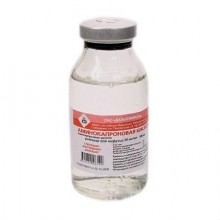



Aminocaproic acid - hemostatic agent, an inhibitor of fibrinolysis. It blocks the action of plasminogen activators, inhibits the action of plasmin, partially inhibits kinins. Aminocaproic acid also has some antiallergic activity and slightly increases the antitoxic function of the liver.
To stop bleeding during surgical interventions and various pathological conditions, accompanied by increased fibrinolytic activity of the blood and tissues (after operations on the lungs, prostate, pancreas and thyroid gland). Prevention of the development of secondary hyperfibrinogenemia with massive transfusions of canned blood.
1 ml contains aminocaproic acid 50 mg
No customer reviews for the moment.
Aminocaproic acid solution is administered intravenously.
For adults, the drug is administered intravenously in the form of a 5% solution in an amount up to 100 ml drip at a rate of 50-60 drops per minute (for 15-30 minutes). During the first hour it is recommended to inject 4–5 g (80–100 ml) of the preparation, and then, if necessary, 1 g (20 ml) every hour for about 8 hours or until the bleeding stops. In the case of continuing or re-bleeding injection of a 5% solution of aminocaproic acid, repeat every 4 hours.
The introduction of aminocaproic acid solution can be combined with the infusion of glucose solution, hydrolysates and antishock solutions. In acute fibrinolysis, when the content of fibrinogen in the blood drops sharply, the administration of aminocaproic acid must be supplemented with a subsequent infusion of fibrinogen.
With caution:
It can be combined with the introduction of hydrolysates, glucose solutions (solutions of dextrose), antishock solutions. In acute fibrinolysis, the administration of aminocaproic acid with a fibrinogen content of 2-4 g (maximum - 8 g) must be supplemented with a subsequent infusion.
Antiaggregate reduction while taking direct and indirect anticoagulants.
No drugs should be added to the aminocaproic acid solution.
Contraindicated in pregnancy and lactation.
Upon appointment Aminocaproic acid it is necessary to control the fibrinolytic activity of the blood and the content of fibrinogen.
There are reports of inappropriate use in women for the prevention of elevated blood loss during childbirth due to the possibility of thromboembolic complications in the postpartum period.
Increased side effects (dizziness, nausea, diarrhea, catarrh of the upper respiratory tract) and severe inhibition of fibrinolysis.
In cases of overdose, plasminogen activators should be promptly administered (streptokinase, urokinase or anistreptase).